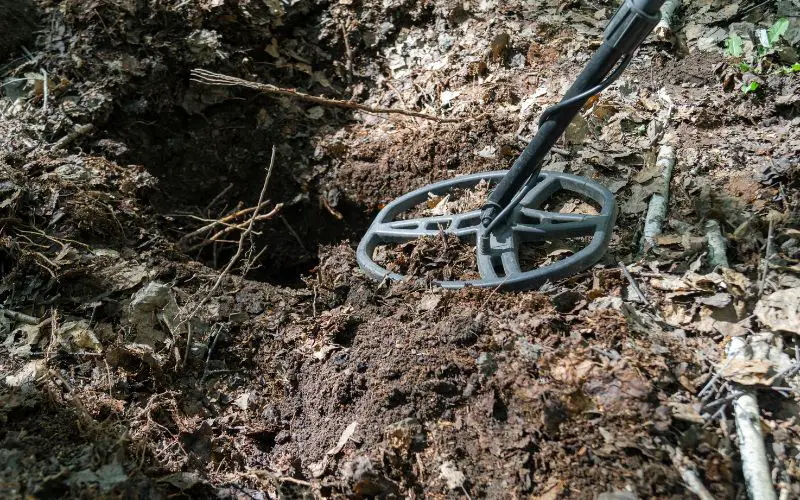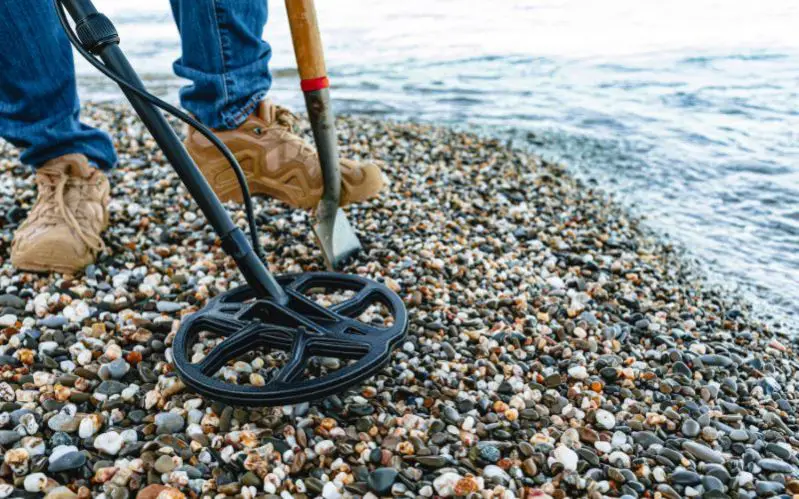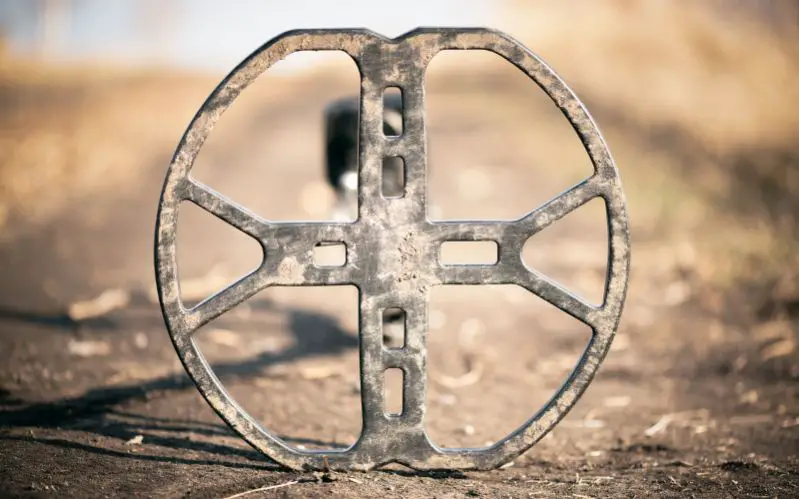
Many people aren’t as successful as they should be while metal detecting, simply because they haven’t chosen the right coil size. Indeed, this can significantly impact your results …
In this article I clearly explain the factors that you should consider to select the best coil size for your machine.
I share the advantages and drawbacks of each size and when you should or should not use them.
Let’s dive in!
Key Takeaways
- Coil size has a direct correlation with your detection depth, sensitivity as well as maneuverability. That’s why, your goals should determine your choice.
- If you opt for a smaller coil, then you should notice a superior target separation even in tight spaces. Larger coils will provide you instead with a better depth and ground coverage.
- Always make sure to adapt your machine’s settings to your coil size to get the most out of it.
Pros and cons of using a small coil
Pros
- Better sensitivity: smaller coils can pick up smaller targets easily. They are ideal to find tiny or delicate objects like small gold nuggets and dust for example. (You can have a look at this metal detector model that comes with a small coil to have an idea)
- Maneuverability: You should be able to easily navigate tight or cluttered spaces. This includes rocks, tree roots as well as dense vegetations.
- Less weight: smaller coils are typically lighter. This is extremely important for longue hunts where you will avoid fatigue.
Cons
- Reduced depth: These coils have a very restricted detection depth. This is not ideal if you are looking for things like relics that are typically buried quite deep underneath the ground.
- Slower ground coverage: Since they are smaller, you will naturally cover less space. For this you will need to swing more times an area comparing with a larger coil. Otherwise, you might miss valuable targets nearby.
- Not recommended in open areas: If you are detecting in places like farms, fields or even parks, then this is not really recommended.
Pros and cons of using a medium-sized coil
Pros
- Balanced depth & sensitivity: Mid-sized coils bring a good balance between depth and sensitivity. This makes them really versatile for almost any situation. (You can have a look at this metal detector model that comes with a medium-sized coil to get an idea)
- Moderate ground coverage: They cover significantly more ground than small coils. This will help reduce search time while maintaining a nice level of maneuverability.
- Great for beginners: This size of coils is great for general-purpose detecting which makes it an ideal choice for beginners who are looking for a machine that can be suitable for most detecting scenarios and most ground types (from parks to fields and beaches).
Cons
- Not as precise in cluttered areas: If you are about to detect in a trashy place. Then you might struggle quite a bit because of a lack of target separation.
- Heavier than small coils: Well, this should not be a big problem in most cases (because metal detectors are generally light anyways). But this is still something to take into consideration.
- Compromise on depth & sensitivity: Mid-sized coils are versatile, yet they may not provide the best possible performance while dealing with tiny objects or searching for deeper targets.
Pros and cons of using a large coil
Pros
- Greater depth detection: Large coils will make your machine metal detect at maximum depth. If you are an old coins lover like me, then you will enjoy that (You can have a look at this metal detector model that comes with a large coil to see what they look like)
- Amazing ground coverage: You won’t need to swing a single place more than few times before making sure whether there is something to be found or not.
- Solid signal strength: You will notice that signals are much stronger. This is a good thing to identify & distinguish between targets.
Cons
- Less sensitivity: you will notice that when you are dealing with smaller targets.
- Heavier: If you are not used to metal detecting, then this might be an issue after an hour of continuous detecting as you should start noticing some fatigue. This should not represent an issue for seasoned detectorists.
- Limited maneuverability: Larger coils could be quite challenging to navigate in tight or cluttered spaces. These include fences, rocky terrains, and bushes …. Their size also makes pinpointing targets a very difficult target (pinpointers are very important in such a case)
How to choose a metal detector coil? What factors to consider?
Well, there are so many factors that you should consider. Below are the most important ones:
- Environment: If you are dealing with trashy areas like parks, then you probably should opt for small or medium-sized coil, to be able to properly separate between targets and eliminate trash. Open and clean spaces like farms or fields are optimal for larger coils.
- Target size & depth: For smaller targets you should opt for smaller coils. For larger & deeper targets you should opt for a larger coil.
- Weight & comfort: This mainly depends on the person, whether they are used to the hobby or not, whether they are fit … What you need to take into consideration is that the coil size is directly correlated with the added detector weight.
- Compatibility: Not every coil you will find out there in the market will be compatible with your current machine. If you want to add a new coil to your gear, first, make sure it is compatible!
- Coil Type: You also need to consider the coil type, not only size (I give more details later in this same article). For example, concentric coils offer great target discrimination.
Coil size recommendations for different environments and targets

Some people don’t care about most of the things I’ve shared in this article. They only care about how to choose the coil size based on the environment/ground condition. Below some factors to consider:
- Parks and playgrounds: Use a small or mid-sized coil to properly deal with trashy soil.
- Beaches: I love detecting there btw; to detect there, I highly recommend using a medium or large coil as targets there are usually buried quite deep.
- Relic hunting: Large coils are the best option in my opinion. Indeed, relics are usually found deep, and their location is unpredictable. You need to minimize the guesswork by covering more space with a large coil.
- Gold prospecting: Most gold detectors come with a small coil. This says it all. Small coils make you deal with highly conductive soil and pick up the nuggets you are looking for regardless of how small they are.
- Woodlands and fields: I usually opt for larger coils here, but a medium one should be just fine as well!
Tips for getting the most out of your chosen coil size
If you are not really interested in adding a now coil size to your gear and prefer to keep using the one you already have, then I share couple of tips below that should help you make the most out of your coil, regardless of its size:
Always try to match the coil size to your detecting environment: I’ve just explained the ground condition that would fit your coil size. Based on that try to make at least 80% of the places where you are going to detect match the recommended ground condition where your coil is supposed to operate the best.
- Adjust detector settings if necessary: This is usually explained in the manual guide. For detectors that support different coil sizes. You should find a section that clearly explains the right default settings to use based on it. Just Copy Paste! (If you are not sure you can learn how you can adjust discrimination & how you can adjust sensitivity)
- Coil control: If you are not maintaining a consistent & low coil-to-ground height while smoothly swinging, then you won’t enjoy the maximum capacity of your detector regardless of its size.
- Regular maintenance: Always keep it clean and try to inspect it from time to time to make sure it has no damage whatsoever. A well-maintained coil will always continue to perform well. A coil cover is a good way to protect it from wear.
Comparison Table (Concentric, Monoloop, Double D)

| Coil Type | Target Nature | Target Depth | Ground Conditions | Other Characteristics |
| Concentric | Small and shallow targets
Good for coin-sized objects |
Moderate depth | Best in low to moderately mineralized soil | Good target separation
Easier to pinpoint targets |
| Monoloop | Larger and deeper targets
Good for nugget-sized items |
Greater depth | Performs well in highly mineralized ground | Not as effective for target separation |
| Double D | All target sizes, Good for varied objects | Deep targets | Adapts well to various ground conditions, including mineralized soil | Excellent ground coverage
Better in mineralized conditions Good target discrimination |
Frequently Asked Question:
What is better 0.4 or 1.2 coil?
A 0.4 coil is better for target separation and detecting smaller items, while a 1.2 coil offers greater depth and ground coverage for larger targets. Choose based on your detecting goals.
Is 1.2 or 0.8 coil better?
Choosing between a 1.2 and 0.8 coil depends on your detecting goals. A 1.2 coil offers greater depth and ground coverage for larger targets, while a 0.8 coil provides better target separation and sensitivity to smaller items. Select based on your preferences and environment.
Which is better 0.4 or 0.2 coil?
Choosing between a 0.4 and 0.2 coil depends on your needs. A 0.4 coil offers better depth and sensitivity for small targets, while a 0.2 coil provides enhanced target separation in trashy areas. Select based on your detecting objectives and environment.
Final Thoughts …
I am very happy you’ve taken the time to navigate through this article. Indeed, by learning this kind of info about your machines coil, your detecting abilities will definitely skyrocket …
You should notice much better results! Keep in mind that many detectorists aren’t aware of this info in this article! You will have a nice advantage here!
Make sure to make the most out of it!
